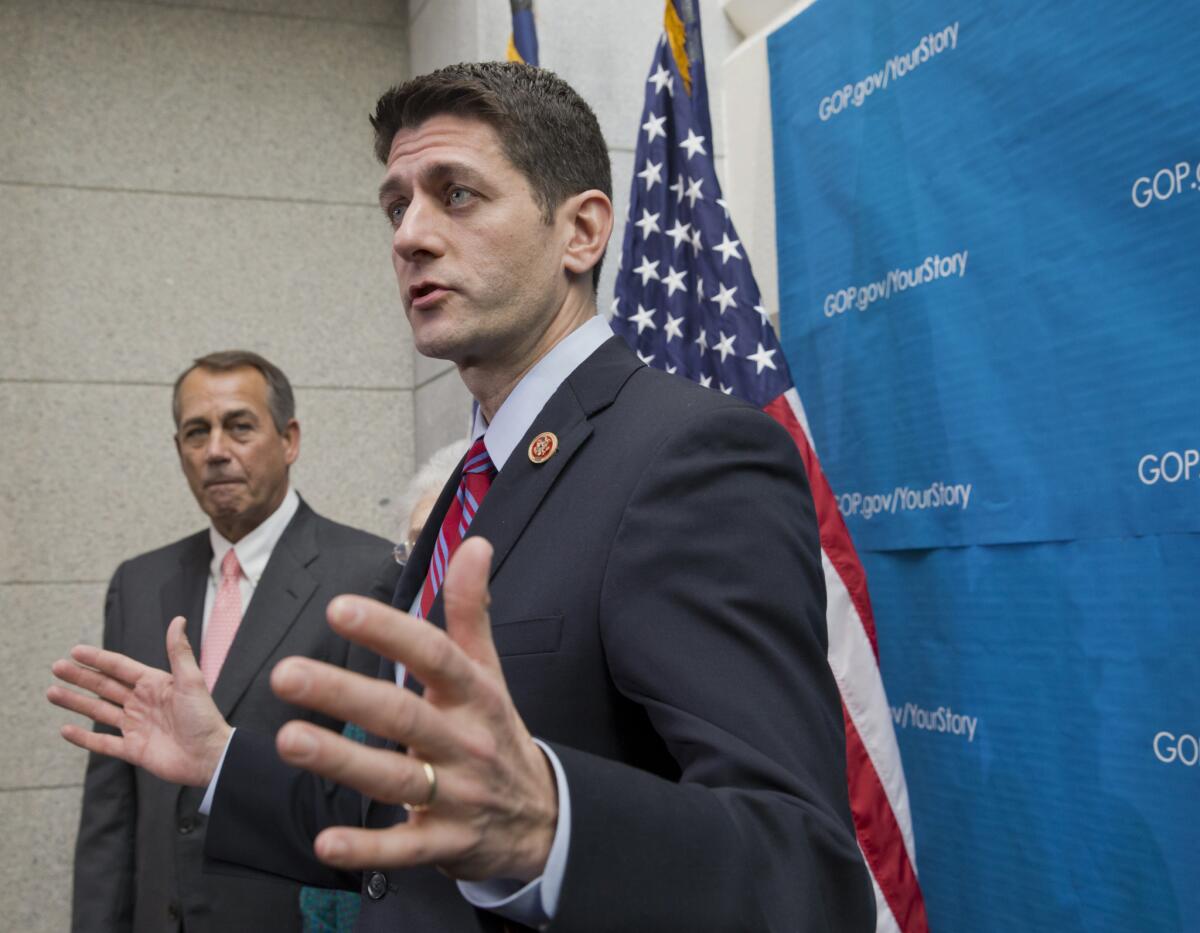Federal budget peace in our time? Not for long.

- Share via
When leaders of the House and Senate budget committees announced a deal that would set spending limits through September 2015, some hoped it signaled a lengthy respite from the fiscal battling and brinkmanship that led to October’s partial government shutdown.
Umm, no.
The Budget Control Act of 2013 that Rep. Paul D. Ryan (R-Wis.) and Sen. Patty Murray (D-Wash.) negotiated did not include an increase in the statutory debt ceiling, despite the fact that the spending limits in the proposal assume hundreds of billions of dollars in additional borrowing. That omission sets the stage for another fight over whether to raise the debt ceiling early next year, when the Treasury is expected to reach its current borrowing limit.
YEAR IN REVIEW: Washington’s 5 biggest ‘fails’ of 2013
How big that fight will be remains to be seen, but there will be one. Ryan confirmed as much Sunday on Fox News. When asked by Fox’s Chris Wallace if Republicans were going to demand something in return for raising the debt limit, Ryan responded: “We as a caucus, along with our Senate counterparts, are going to meet and discuss what it is we want to get out of the debt limit. We don’t want nothing out of this debt limit. We’re going to decide what it is we can accomplish out of this debt-limit fight.”
Clearly, Republicans and Democrats took away two very different lessons from October’s shutdown circus. The shutdown occurred just as the federal government was about to hit the debt ceiling, so the two issues -- reopening federal agencies and raising the debt limit -- intertwined. Republicans appear to regret the politically damaging shutdown, which they triggered by refusing to pass a stopgap spending bill unless Democrats agreed to make major changes to the 2010 healthcare law (a.k.a. Obamacare). But they think they can force concessions out of the White House and Senate Democrats next year by refusing to increase the debt limit.
The White House insisted on a “clean” (i.e., unconditional) debt-limit increase in October, and that’s pretty much what it got, albeit for a limited period. President Obama has said that he made a mistake in 2011 when he bargained with the GOP over the debt limit and that he won’t do it again for fear of reinforcing a bad precedent.
YEAR IN REVIEW: Kindness in the world of politics? 7 uplifting examples from 2013
It’s hard to see a happy ending to this drama. For Republicans, the debt limit provides a rare opportunity to force changes in entitlement programs that spend ever-increasing amounts on autopilot. The GOP’s solutions typically involve shifting more of the cost of those programs onto beneficiaries, or narrowing eligibility and trimming benefits.
Democrats, who are loath to cut benefits or reduce eligibility, say they’ll curb entitlements only as part of a package that also ends tax breaks for corporations and higher-income Americans. But while Ryan and his colleagues are willing to extract higher fees for government services, raising tax revenue is a nonstarter.
Even Democrats have to concede that health-related entitlements (most notably Medicare and Medicaid) are the biggest threats to the federal government’s fiscal health over the long term. Solving that problem, though, means attacking the root -- rising healthcare costs -- and not just who’s eligible for them or how large the benefits are. The 2010 Patient Protection and Affordable Care Act tried to do that in several ways, including experiments with new payment systems designed to promote higher quality, more efficient care. But its most powerful cost-control mechanism for Medicare is so controversial, it may never be implemented.
It’s possible that Republicans will listen to the advice of many economists and financial analysts and decide that the debt limit is too radioactive to take hostage. Threatening not to pay some of the government’s creditors could cause interest rates to jump, not just for Washington but for every American borrower. And causing the stock market to crash and the economy to tank would, ahem, distract from the message that the GOP wants to campaign on in 2014.
The problem is that there’s not a lot of wiggle room in the box House Speaker John A. Boehner (R-Ohio) has constructed on the debt limit. Boehner has repeatedly demanded $1 in spending cuts for every $1 in additional borrowing authority, which is what the 2011 debt-limit deal required. As long as those are the GOP’s terms, the peace won by Ryan and Murray’s budget deal will be short-lived.
ALSO:
Kim Jong Un’s reign of fear: What’s next?
Hard truths about California’s water future
How to make high-speed rail work in California
Follow Jon Healey on Twitter @jcahealey and Google+
More to Read
A cure for the common opinion
Get thought-provoking perspectives with our weekly newsletter.
You may occasionally receive promotional content from the Los Angeles Times.







